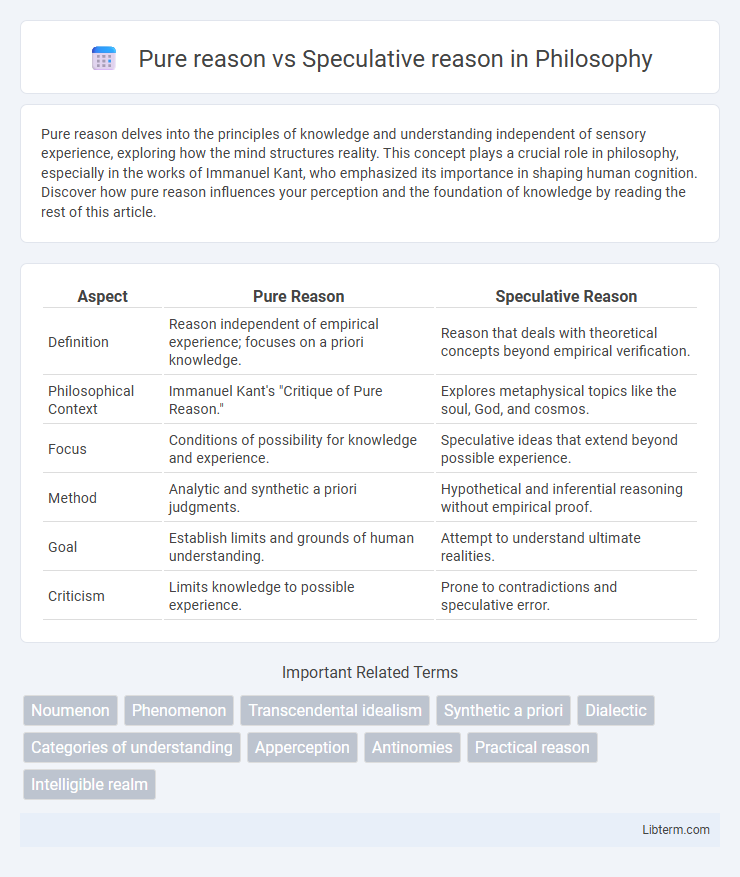Pure reason delves into the principles of knowledge and understanding independent of sensory experience, exploring how the mind structures reality. This concept plays a crucial role in philosophy, especially in the works of Immanuel Kant, who emphasized its importance in shaping human cognition. Discover how pure reason influences your perception and the foundation of knowledge by reading the rest of this article.
Table of Comparison
| Aspect | Pure Reason | Speculative Reason |
|---|---|---|
| Definition | Reason independent of empirical experience; focuses on a priori knowledge. | Reason that deals with theoretical concepts beyond empirical verification. |
| Philosophical Context | Immanuel Kant's "Critique of Pure Reason." | Explores metaphysical topics like the soul, God, and cosmos. |
| Focus | Conditions of possibility for knowledge and experience. | Speculative ideas that extend beyond possible experience. |
| Method | Analytic and synthetic a priori judgments. | Hypothetical and inferential reasoning without empirical proof. |
| Goal | Establish limits and grounds of human understanding. | Attempt to understand ultimate realities. |
| Criticism | Limits knowledge to possible experience. | Prone to contradictions and speculative error. |
Introduction to Pure and Speculative Reason
Pure reason refers to the faculty of the mind that operates independently of sensory experience, aiming to understand a priori principles that underlie knowledge. Speculative reason, a subset of pure reason, engages in abstract thinking and theorizing beyond empirical evidence to explore metaphysical concepts such as existence, causality, and the nature of the self. Kant's critical philosophy distinguishes these forms to investigate the limits and scope of human understanding through pure reason's capacity to generate foundational knowledge without recourse to observation.
Defining Pure Reason
Pure reason refers to the faculty of the mind that enables knowledge independent of sensory experience, focusing on a priori concepts and principles. It is central to Immanuel Kant's philosophy, distinguishing itself from speculative reason, which involves conjectures beyond possible experience. Pure reason provides the foundation for certain knowledge by grounding metaphysics and epistemology in necessary and universal truths.
Understanding Speculative Reason
Speculative reason explores abstract concepts beyond empirical experience, aiming to understand metaphysical realities such as causality, existence, and the nature of the universe. It operates by employing synthetic a priori judgments to derive knowledge that cannot be obtained through sensory input alone. Understanding speculative reason involves grasping its role in transcending empirical limitations to formulate principles underlying phenomena and noumena.
Historical Context and Philosophical Roots
Pure reason, rooted in Immanuel Kant's critical philosophy, emerged during the Enlightenment as a means to establish the foundations of knowledge through a priori principles independent of experience. Speculative reason, influenced by earlier metaphysical traditions such as those of Leibniz and Wolff, aimed to extend knowledge beyond empirical observation into the realm of metaphysical speculation. The historical context reflects a shift from speculative rationalism toward critical philosophy, emphasizing the limits and conditions under which pure reason can validly operate.
Key Differences Between Pure and Speculative Reason
Pure reason involves the faculty of the mind that operates independently of empirical experience, focusing on a priori knowledge and fundamental principles. Speculative reason, by contrast, extends beyond pure logic to hypothesize about metaphysical and theoretical entities, often dealing with concepts that cannot be empirically verified. The key difference lies in pure reason's emphasis on necessary truths derived solely through reasoning, whereas speculative reason engages in conjecture and exploration of ideas beyond immediate logic or sensory data.
Applications of Pure Reason in Philosophy
Pure reason serves as the foundational principle in metaphysics, enabling the generation of a priori knowledge independent of empirical experience. Its application in philosophy facilitates the understanding of concepts such as existence, causality, and necessity through intrinsic cognitive structures. Pure reason underpins critical philosophical inquiries, influencing Kantian epistemology and advancing debates on the limits and scope of human knowledge.
The Role of Speculative Reason in Theoretical Thinking
Speculative reason plays a crucial role in theoretical thinking by enabling the exploration of concepts beyond immediate empirical experience, facilitating hypotheses and abstract reasoning about metaphysical and unknown dimensions. It extends pure reason, which relies strictly on a priori knowledge and logical deduction, by allowing the mind to engage with possibilities and ideas that transcend sensory data. This dynamic broadens the scope of philosophical and scientific inquiry, fostering deeper understanding and innovation in fields like metaphysics, cosmology, and theoretical physics.
Challenges and Criticisms of Each Approach
Pure reason faces challenges in its reliance on a priori knowledge, often criticized for detaching from empirical reality and leading to speculative metaphysics without verifiable evidence. Speculative reason encounters criticisms for its tendency to overextend beyond possible experience, generating hypotheses that lack practical testability and risk subjective interpretation. Both approaches struggle with balancing abstract rational principles against empirical validation, resulting in ongoing philosophical debates about their epistemological limits.
Interplay and Integration of Pure and Speculative Reason
Pure reason, grounded in a priori knowledge, provides the foundational framework for understanding concepts independent of experience, while speculative reason ventures beyond empirical data to hypothesize about metaphysical realities. The interplay between pure and speculative reason is crucial for advancing philosophical inquiry, as pure reason sets the limits and conditions of knowledge, enabling speculative reason to explore possibilities within those boundaries. Integrating these forms allows for a rigorous yet expansive exploration of knowledge, balancing necessary cognitive structures with imaginative hypothesis to deepen comprehension of metaphysical and epistemological questions.
Conclusion: The Importance of Reason in Human Knowledge
Pure reason grounds human knowledge by providing a priori principles that are necessary and universal, enabling certainty beyond empirical experience. Speculative reason explores metaphysical questions, pushing the limits of human understanding despite often encountering contradictions or unresolved issues. The importance of reason lies in its capacity to structure knowledge, foster critical inquiry, and distinguish between valid knowledge claims and mere speculation.
Pure reason Infographic

 libterm.com
libterm.com